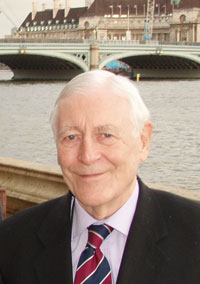Eric Lubbock, 4th Baron Avebury
|
The Right Honourable The Lord Avebury |
|
|---|---|

Lord Avebury in 2006
|
|
| Liberal Chief Whip | |
|
In office 1963 – 18 June 1970 |
|
| Leader |
Jo Grimond Jeremy Thorpe |
| Preceded by | Arthur Holt |
| Succeeded by | David Steel |
| Member of the United Kingdom Parliament for Orpington |
|
|
In office 15 March 1962 – 18 June 1970 |
|
| Preceded by | Donald Sumner |
| Succeeded by | Ivor Stanbrook |
| Personal details | |
| Born |
Eric Reginald Lubbock 29 September 1928 Orpington, UK |
| Died | 14 February 2016 (aged 87) London, UK |
| Nationality | British |
| Political party |
Liberal Liberal Democrat |
| Spouse(s) |
|
| Children |
Lyulph Maurice Victoria John William |
| Education |
Upper Canada College Harrow School Balliol College, Oxford |
| Occupation | Politician |
| Religion | Secular Buddhist |
Eric Reginald Lubbock, 4th Baron Avebury, (29 September 1928 – 14 February 2016) was an English politician. He served as the Liberal Member of Parliament for Orpington from 1962 to 1970. He then served in the House of Lords, having inherited the title of Baron Avebury in 1971, until his death. In 1999, when most hereditary peers were removed from the House of Lords, he was elected by his fellow Liberal Democrats to remain. When he died, he was the longest serving Liberal Democrat peer.
A descendant of William Lubbock (1701–54), he was the son of the Honourable Maurice Fox Pitt Lubbock (the sixth son of John Lubbock, 1st Baron Avebury) and the Honourable Mary Katherine Adelaide Stanley, daughter of Arthur Lyulph Stanley, 5th Baron Sheffield and Stanley of Alderley.
Lubbock was educated at Upper Canada College, an all-boys private school in Toronto, Ontario, Canada, and at Harrow School, an all-boys public school in London, England. He read Engineering Science at Balliol College, Oxford.
He served as a Lieutenant in the Welsh Guards and joined Rolls-Royce in 1951. At the company, he was employed as a production manager (1951–1956) and as a production engineer (1956–1960).
Having joined the Liberal Party in 1960 and become a councillor the following year, Lubbock stood as his party's candidate at the Orpington by-election on 15 March 1962, and gained the seat with a majority of 7,855. This election victory, with a swing of nearly 22% from the Conservatives, was seen as a revival of the Liberal Party at the time. and brought the number of Liberal MPs to seven. Subsequently, Lubbock was dubbed "Orpington Man". However, the party did not make the anticipated recovery; it was hampered by organisational difficulties and progress was slow, with a loss of votes and seats under Harold Wilson’s Labour government.
...
Wikipedia
